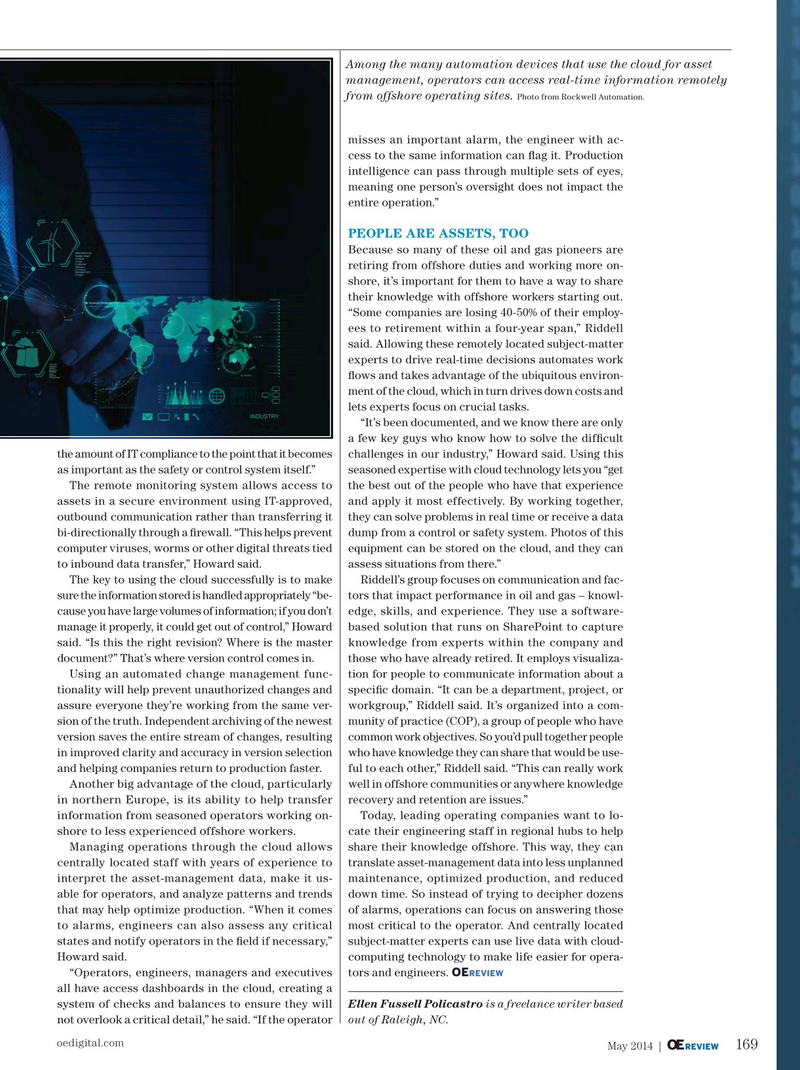
Page 167: of Offshore Engineer Magazine (May/Jun 2014)
Read this page in Pdf, Flash or Html5 edition of May/Jun 2014 Offshore Engineer Magazine
Among the many automation devices that use the cloud for asset management, operators can access real-time information remotely
Photo from Rockwell Automation.
from offshore operating sites. misses an important alarm, the engineer with ac- cess to the same information can ? ag it. Production intelligence can pass through multiple sets of eyes, meaning one person’s oversight does not impact the entire operation.”
PEOPLE ARE ASSETS, TOO
Because so many of these oil and gas pioneers are retiring from offshore duties and working more on- shore, it’s important for them to have a way to share their knowledge with offshore workers starting out. “Some companies are losing 40-50% of their employ- ees to retirement within a four-year span,” Riddell said. Allowing these remotely located subject-matter experts to drive real-time decisions automates work ? ows and takes advantage of the ubiquitous environ- ment of the cloud, which in turn drives down costs and lets experts focus on crucial tasks. “It’s been documented, and we know there are only a few key guys who know how to solve the dif? cult the amount of IT compliance to the point that it becomes challenges in our industry,” Howard said. Using this as important as the safety or control system itself.” seasoned expertise with cloud technology lets you “get
The remote monitoring system allows access to the best out of the people who have that experience assets in a secure environment using IT-approved, and apply it most effectively. By working together, outbound communication rather than transferring it they can solve problems in real time or receive a data bi-directionally through a ? rewall. “This helps prevent dump from a control or safety system. Photos of this computer viruses, worms or other digital threats tied equipment can be stored on the cloud, and they can to inbound data transfer,” Howard said. assess situations from there.”
The key to using the cloud successfully is to make
Riddell’s group focuses on communication and fac- sure the information stored is handled appropriately “be- tors that impact performance in oil and gas – knowl- cause you have large volumes of information; if you don’t edge, skills, and experience. They use a software- manage it properly, it could get out of control,” Howard based solution that runs on SharePoint to capture said. “Is this the right revision? Where is the master knowledge from experts within the company and document?” That’s where version control comes in.
those who have already retired. It employs visualiza-
Using an automated change management func- tion for people to communicate information about a tionality will help prevent unauthorized changes and speci? c domain. “It can be a department, project, or assure everyone they’re working from the same ver- workgroup,” Riddell said. It’s organized into a com- sion of the truth. Independent archiving of the newest munity of practice (COP), a group of people who have version saves the entire stream of changes, resulting common work objectives. So you’d pull together people in improved clarity and accuracy in version selection who have knowledge they can share that would be use- and helping companies return to production faster. ful to each other,” Riddell said. “This can really work
Another big advantage of the cloud, particularly well in offshore communities or anywhere knowledge in northern Europe, is its ability to help transfer recovery and retention are issues.”
Today, leading operating companies want to lo- information from seasoned operators working on- cate their engineering staff in regional hubs to help shore to less experienced offshore workers.
Managing operations through the cloud allows share their knowledge offshore. This way, they can centrally located staff with years of experience to translate asset-management data into less unplanned interpret the asset-management data, make it us- maintenance, optimized production, and reduced able for operators, and analyze patterns and trends down time. So instead of trying to decipher dozens that may help optimize production. “When it comes of alarms, operations can focus on answering those to alarms, engineers can also assess any critical most critical to the operator. And centrally located states and notify operators in the ? eld if necessary,” subject-matter experts can use live data with cloud-
Howard said.
computing technology to make life easier for opera-
REVIEW “Operators, engineers, managers and executives tors and engineers. OE all have access dashboards in the cloud, creating a system of checks and balances to ensure they will Ellen Fussell Policastro is a freelance writer based not overlook a critical detail,” he said. “If the operator out of Raleigh, NC.
oedigital.com 169
May 2014 | OE REVIEW 0514OER_Asset_mgt.indd 169 4/19/14 11:38 AM

 166
166

 168
168